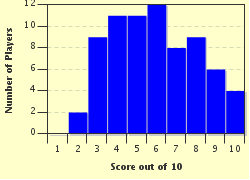Quiz Answer Key and Fun Facts
1. Two tribes from up north tried to take up land in the Roman world around 110 BC. The Cimbri came from what we would know call Denmark, but which other tribe has probably given its name to what Germans call their country?
2. One of the most impressive defeats of the Roman Imperial legions took place in the reign of Emperor Augustus, in 9 AD. Who was the Roman general blamed by Augustus for the loss of these legions?
3. Who was the first ruler of Germanic descent to be crowned Emperor in 800?
4. Present-day Germany was added to the Frankish kingdom (later Empire) in various campaigns, the last one in 797. From 797 until 919, this territory was part of Franconia (later Eastern Franconia). But who was the first to be elected King of Germany in 919 AD?
5. A new German King or Emperor was usually chosen by some of the most prominent regional rulers. Which of the following *never* was a Prince-Elector (or in German, a "Kurfürst")?
6. One of the few female scientists in the Middle Ages was Hildegard of Bingen. To which monastic order did this polymath belong?
7. Why did the German Emperor and the Pope frequently quarrel during the Eleventh Century?
8. Which of the following cities was the capital of the Hanseatic League?
9. Emperor Frederick I had a distinctive characteristic, that inspired his nickname. What was it?
10. During about a decade, there were two rival Kings of Germany at the same time.
Source: Author
JanIQ
This quiz was reviewed by FunTrivia editor
bloomsby before going online.
Any errors found in FunTrivia content are routinely corrected through our feedback system.

